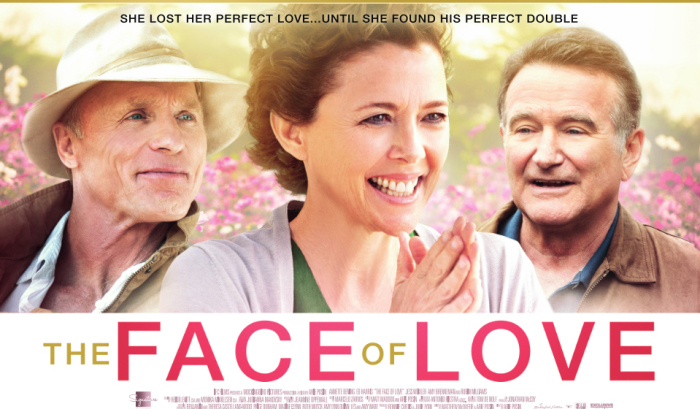
The Face Of Love Review
The Face of Love tells the story of Nikki (Annette Bening) whose husband Garrett (Ed Harris), the love of her life, drowns during a trip to Mexico just as they are celebrating 30 years of marriage. Five years later, Nikki seems to have recovered from the shock but it quickly becomes clear that, in spite of what she tells her daughter Summer (Jess Weixler) or her neighbour Roger (Robin Williams), Nikki is a woman languishing in grief, unable to let go. Ironically, she “stages” houses, turning them from “mausoleums” worthy of Norma Desmond (her words) into places that look lived in, when in fact they have stood empty for years. Yes, the parallels really are that obvious. During a trip to a museum she and Garrett used to visit together, Nikki spots Tom (Harris, again) who looks exactly like her deceased husband. Finding out that he teaches art at a nearby college, Nikki finds him there and persuades him to teach her to paint. The two quickly fall in love. Sounds a little bizarre and more than a little creepy? That’s because it is. And it obviously raises a lot of questions: who is Nikki really in love with; Tom or Garrett? What will happen when Tom finds out that she stalked him because he is the spitting image of her late husband? How will Roger and Summer react when they meet Tom?
It is these questions, and the discrepant awareness between the audience and Tom that create the film’s suspense and its strange appeal. We do not quite know, until just before the end, if Nikki ever stops seeing Garrett and starts seeing Tom. Everything she says has a double meaning, a subtext that the audience hears while Tom remains oblivious, at least at first. When he catches on at last, it’s pretty much confrontation-time anyway.
If you are drawn to this film mainly by its cast, then you are in for a treat. Bening soars as she turns Nikki into a comprehensible and sympathetic character, and the film into a study of what grief can do to people, rather than an account of a woman gone crazy. Together, Bening and Harris create a sense of true intimacy, both between Nikki and Garrett and Nikki and Tom (yes, weird). The chemistry between them is so great that we wonder if perhaps this utterly fraud situation can end well after all. Williams does the best he can with a part that doesn’t offer him much to play with. Nod to Jess Weixler who manages to hold her own next to three Hollywood heavyweights.
More’s the pity, therefore, that just about everything else about The Face of Love is, simply put, a bit bland. The camerawork is hardly exciting (disappointing in a film in which art looms large) and feels a lot like we have seen it all before, except perhaps for a few moments when the camera creates images that seem truthful rather than flattering. Some of the lines in Arie Posin (who also directs) and Matthew McDuffie’s script are shudder-inducingly pretentious. Again, it is testimony to the actors’ skill that they manage to deliver them without sounding daft.
What’s interesting is that, despite the singular in the title, love in this film has more than one face: new love, lost love, love that has Nikki prepared to go to absurd lengths to keep it alive. Unfortunately, the film’s exploration of Nikki’s disassociation from reality only runs skin-deep. Given the imagery of water and drowning that is present at every turn this seems particularly obvious. And it may require a fair amount of suspension of the audience’s disbelief to accept that Nikki simply takes meeting Garrett’s doppelgänger at face value. The thought that she may be losing it never seems to occur to her, even though it is pretty clear to the rest of us that her choices are neither completely sane, nor morally sound. Equally strangely, Tom never seems to wonder why Nikki keeps calling him Garrett at inopportune moments.
The Face of Love is worth seeing at least once, if not for its suspense, then for Bening’s sheer brilliance. However, the muted response it has received is hardly surprising which, given its promising and compelling premise, is a bit of a shame.
Anne Korn

